The Rise of Bernie Sanders and His ‘Revolution’ Sparks Déjà Vu in the ‘Third World’
Michael Manley of Jamaica and others pushed decades ago for progressive change to end the systems of subjugation in their countries. But that will remain tough to achieve until it is accomplished in the U.S.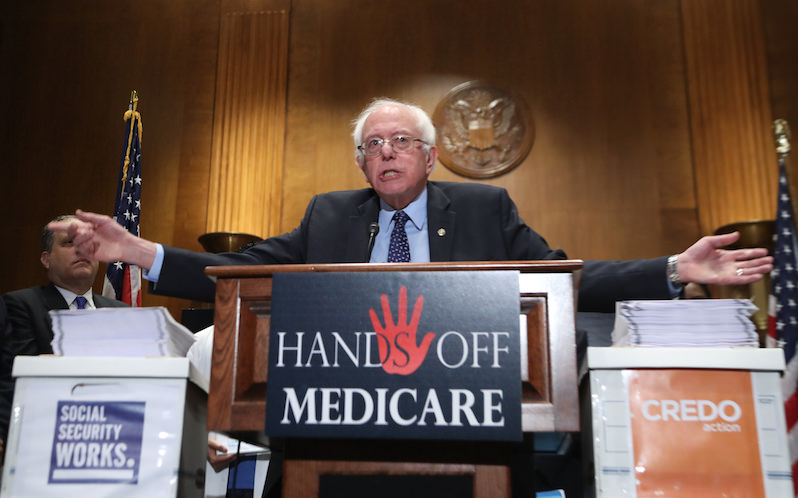 Sen. Bernie Sanders of Vermont. (Manuel Balce Ceneta / AP)
Sen. Bernie Sanders of Vermont. (Manuel Balce Ceneta / AP)
By David Cupples / TruthoutAuthor’s note: The term “Third World” is used here because “developing countries” seems an egregious euphemism that suggests these countries are coming along just fine within “the system” as it is, and also because it serves as a reminder of the bloc’s history of subjugation to colonialism and its successor, neoliberalism.
Residents of the Third World and people who have come to understand its history within the context of the world system must be reeling with déjà vu thickly stewed in irony at the rise of Bernie Sanders and his “social revolution.” Many Third World leaders have come to office with plans to effect changes very similar to those advocated by Sanders. These leaders have been called socialist, social democrat, communist, Marxist and even democratic socialist, like Sanders — all leftists in an age of corporate capitalism backed by military force.
An exhaustive account is beyond the scope of the present discussion, but a sampling within the domains of the Monroe Doctrine — the Western Hemisphere that the United States considers by manifest destiny its dominion to rule over as it pleases — offers notable cases: Jamaica during the Bob Marley-Michael Manley era, Guatemala under Jacobo Árbenz, Dominican Republic during the time of Juan Bosch, Haiti under Jean-Bertrand Aristide, and Nicaragua after the Sandinista overthrow of Somoza. We might also include Brazil under João Goulart and Chile under Salvador Allende.
One imagines the thrill and excitement that swept through those lands, filling the people with much the same hope for progressive change that Sanders has engendered in many Americans. For the first time in a long while, perhaps, it seemed that the government was actually trying to help the people rather than singularly appease foreign corporations and the tiny domestic elite that owned most of the land and wealth. Are not the dreams of people the same everywhere: to live a life in peace, free from overburdening hardship, with the children able to go to school and live happy, fruitful lives? The stakes were high in the Third World, of course, not just because the poverty was so stark but because the dream for better was frequently drowned in rivers of blood.
Michael Manley — Jamaica (1972-1980 and 1989-1992)
Michael Manley, a democratic socialist, was elected prime minister of Jamaica only 10 years after the country’s emancipation from the U.K. in 1962. Like Bernie Sanders, Manley played the “Mr. Smith goes to Washington” role in standing up for the suffering masses; as with Sanders, this made Manley both wildly popular and a worrisome threat to the corporate-capitalist establishment.
Manley’s core platform was almost a mirror image of that put forth by Bernie Sanders. Programs included higher wages, expanded health care, free education through tertiary level and other social services. Good progress was made in the beginning, but the United States soon grew disenchanted with Manley’s independent stance — especially when he negotiated higher royalties from American bauxite companies, nationalized 51 percent of mining operations and repatriated a quarter-million acres of land (paying a fair price for it).
For the sin of believing that Jamaica’s natural resources should benefit the Jamaican people rather than foreign corporations and investors, Manley may have become the target of a CIA destabilization program intended to bring down his administration. (Former CIA case officers Philip Agee and John Stockwell both saw the hidden hand of the CIA. Agee even named the CIA case officers stationed undercover in the U.S. embassy in Kingston. My novel “Stir It Up” comprehensively summarizes in narrative form the evidence for the destabilization program.)
The nature of a CIA destabilization program is perhaps best captured in President Nixon’s fervor to force Salvador Allende from office in Chile, when he directed Henry Kissinger to “make the economy scream.” In other words, ratchet up the suffering of the Chilean people so they will rise up and throw the bum out on his ear. This could be achieved in a thousand and one ways — fouling the bearings of city buses, blowing up bridges, poisoning shipments of rice and flour and on and on. If such shenanigans failed, destabilization might well escalate to more serious measures, including political assassination (once banned by President Reagan, the practice was reauthorized after 9/11 by George W. Bush) or even military invasion.
For various reasons in Jamaica — including political cronyism that saw your side go hungry when the other guys won office — rival street gangs became allied with the two major political parties, Manley’s People’s National Party (PNP) and the Jamaica Labor Party (JLP), headed by Edward Seaga. With the elections of 1976 coming up, the United States was desperate to get Manley out and Harvard-educated, pro-business Seaga in. As “tribal war” raged between street gangs allied to the two major political parties, a bullseye was painted on Manley’s back. (Journalist and filmmaker Saul Landau was with Manley in Kingston as one assassination attempt went down.)
Bob Marley, whom Time magazine concluded was a political force to rival the Jamaican government, was also targeted for death. On Dec. 3, 1976 — 12 days ahead of national elections — Marley came under the gun. Under the cover of night, two carloads of gunmen drove into his Kingston home and shot it up with automatic weapons; Bob, his wife Rita and at least two others were wounded. Suspicions linger that the CIA was behind it.
READ: Forty Years Ago, the CIA Had Its Eye on Jamaica—and Bob Marley Got Shot
Despite it all, Michael Manley prevailed and won a second term in office. But the fireworks heated up again in 1980 as Manley was once more paired off against Seaga. As the carnage in the streets escalated to horrendous levels, Manley was voted out in elections that were perhaps fair, technically, but hardly so given the upheaval and bloodshed — and the implicit threat that another Manley term would bring only harsher retribution from the United States with the coming to office of Ronald Reagan (who would invade tiny Grenada on the flimsiest of pretexts and who launched a brutal guerrilla war against the Sandinistas — see below).
Guatemala, Brazil, Dominican Republic
In Guatemala, Jacobo Árbenz came to power in 1951 and expanded the right to vote, worked to give opportunities for workers to organize and distributed land to peasants — steps one imagines Bernie Sanders might well have initiated had he been there. For his efforts, Árbenz incurred the wrath of the powerful United Fruit Company (known throughout Latin America as “the Octopus”). A CIA-backed coup deposed Árbenz after only three years in office, bringing a military junta and endless suffering.
In the early 1960s, U.S.-backed military coups also brought down the leaders of Brazil (João Goulart) and Dominican Republic (Juan Bosch). On the face of it, Goulart and Bosch were innocuous enough — Goulart a principled anti-communist instituting such drastic measures as raising the minimum wage, and Bosch a “Kennedy liberal,” in the estimation of Noam Chomsky. But both, like Árbenz in Guatemala, were involved in helping workers and peasants organize, constituting a threat to U.S. business interests. Again, this is all very similar to what one imagines Bernie Sanders would have done then and would likely do here now. For their relatively mild actions, Goulart and Bosch were promptly removed in U.S-supported military coups.
Salvador Allende — Chile (1970-1973)
One of the most extreme of these leftist leaders (in the eyes of the US government, at least) was Salvador Allende of Chile. Branded a Marxist (Wikipedia) Allende was demonized for such actions as nationalizing the copper industry, with U.S. companies Anaconda and Kennecott two of the biggest players.
Perspective on Allende’s villainy may be shed by Michael Manley’s widow, the former First Lady of Jamaica. Beverley Manley had been active in her husband’s government and knew many of the region’s leaders on an at least casual personal basis. Manley attributes to Allende the statement that all he wanted from Chilean copper was that each child in the country could have one glass of milk a day.
For such heresies Allende was made the target of a CIA destabilization program against the Chilean government. When that didn’t act fast enough, the U.S. backed Pinochet’s bloody coup that saw Allende killed in the Sept. 11, 1973 bombing of the presidential palace, purportedly a victim of self-inflicted gunshots.
Jean-Bertrand Aristide — Haiti (1991, 1994-1996, 1996-2004)
Jean-Bertrand Aristide was a Roman Catholic priest who subscribed to liberation theology, the newly emergent doctrine that after a millennium and a half, the Church ought to finally give a little attention to the plight of the poor. Aristide swept into office in 1991 as a populist appealing to the suffering masses — Haiti’s first democratically-elected leader. The Aristide social revolution was along the lines of the others discussed here — raising the minimum wage, expanding access to health care and education, land reform and so forth. His efforts met with the approval of the World Bank and Inter-American Development Bank — but not the powers that be, as a military coup removed him from office before the year was up.
President Clinton, in a cruel charade, made a show of respecting democratic principles in restoring Aristide to office under strict neoliberal conditions that Chomsky says were “virtually guaranteed to demolish the remaining shreds of economic sovereignty.” When Aristide persisted in attempting to serve his people, he was removed for good in a 2004 coup many feel was orchestrated by the U.S.
Sandinista Revolution (1979) and Contra War — Nicaragua
In 1979, Sandinista revolutionaries overthrew Nicaraguan dictator Anastasio Somoza Debayle, ending the half-century reign of a regime that grew fat off the blood, sweat and tears of the poor masses — Nicaragua long considered one of the poorest countries in the hemisphere. The Sandinistas under Daniel Ortega attempted to reverse this and were remarkably successful. Oxfam concluded that the Sandinista government was “exceptional in the strength of [its] commitment … to improving the conditions of the people and encouraging their active participation in the development process.”
The subsequent history is heartbreaking. Just when the people had begun to believe that there really could be a better tomorrow, Reagan launched his Contra War that embroiled the country in another decade of slaughter that took the lives of 40,000 or more, mostly peasant men, women and children. Chomsky writes: “The hatred that was elicited by the Sandinistas for trying to direct resources to the poor (and even succeeding at it) was truly wondrous to behold.”
The brutality of the Contras and right-wing militias throughout Latin America (the term “death squads” fails to capture the horror they invoked) was medieval:
“…elite American-trained battalions leaving behind women hanging by their feet with their breasts cut off and their facial skin peeled back, bleeding to death.” (El Salvador)
“…troops going into a village, collecting the population in the central town building, taking out the men and beheading them, raping and then killing the women, taking out the children and smashing them to pieces against rocks.” (Guatemala)
“…taking a fourteen-year-old girl, raping her, slitting her throat, cutting off her head and putting it on a pole to intimidate the rest of the population.” (Nicaragua during the Contra reign of terror)
Social Revolution or Status Quo?
Clearly, social revolutionaries haven’t fared well when they’ve run up against the United States. Why should the richest nation in history be so concerned about the policies of poor, often small nations, many of which play relatively inconsequential roles in the world economy? In the U.S. neoliberal system, the Third World — whether designated “developing world” or “least developed countries” or whatever other euphemism is conjured up — is meant to play a service role: sewing garments, assembling parts, growing crops for export and so forth. In a “race to the bottom,” multinational corporations scour the earth to find the lowest wages for labor for their factories and move on to the next lucky country if it should be discovered workers there can be paid even less. As such, the people are kept poor and hungry so that these menial jobs are fought over, with no real development ever taking place. The wealthy elite class — indeed, the profit-at-all-cost corporate system as a whole — requires for its maintenance that a large proportion of the world’s population remain, essentially, slaves.
The slightest move toward breaking away is met with swift retaliation — economic sanctions, embargoes, CIA destabilization, military coups, armed invasion. Successful independent development outside the system is likened by Chomsky to a virus — a malignancy with the tendency to spread. If Jamaica invested resources into educating its people, providing health care and lifting its standard of living for the worst off — if Michael Manley’s programs had brought stability and prosperity to 1970s Jamaica — the temptation would have been great for other countries throughout the region to follow suit. This could not be allowed. Manley’s friendship with Fidel Castro may have ratcheted up the intensity, but the underlying dynamic was always there, independent of Castro or the USSR or anything other than the threat of breaking free from the system and prospering.
The pattern generalizes beyond the Western Hemisphere to every corner of the globe, especially in countries that have bearing upon or might conceivably at some future time have bearing upon U.S. business interests. Notorious cases range from Mohammad Mosaddegh in Iran (deposed in the 1953 CIA-backed coup that restored the Shah to power) to the populist Sukarno in Indonesia (whose similar fate led to the bloody reign of Suharto) to the assassinated pan-Africanist Patrice Lumumba in Congo. Lumumba, Congo’s first democratically elected prime minister, was in office in 1960 about as long as a summer romance because he was a “radical nationalist” who wished to use the country’s vast natural resources for the benefit of the people and thus was in need of “urgent removal,” according to CIA head Allen Dulles.
It might come as something of a mystery why similar yearnings for radical change should arise in both the “richest nation in history” and some of the poorest. Then again, no, in light of the increasingly shocking levels of economic disparity being reported in the United States. Each new revelation suggests that this fabulously wealthy Kingdom of Mammon has given birth from its own belly to a new Third World nation of struggling, even impoverished souls, disproportionately people of color — a Third World nation which in truth has always been there but which has gained notoriety of late as the pain becomes just too excruciating and its ranks swell. Is not the suffering of people of color in the United States today, including police oppression giving rise to movements such as Black Lives Matter — is it not in some sense the “home version” of the bloody horrors subjected to living, breathing human beings beyond our borders?
Given the unkind fate of so many of these social revolutionaries, it is clear corporate capitalism is not going to give up without a fight. The mainstream media isn’t likely to spread truth that would cause it to lose money. Systems of power have no motivation to share their power. To borrow a line from the film “Mississippi Burning,” “rattlesnakes don’t commit suicide.”
Many peoples around the planet yearn for progressive action from their governments — for the social revolution that would bring equitable economic opportunity, protect the environment, provide for basic human rights and needs, promote respect for the diverse cultural rainbow of humankind and greatly reduce the threat of war. The rise of the “Global South” with leaders like Bolivia’s Evo Morales and a new spirit of unity as manifested in the Community of Latin American and Caribbean States (CELAC) has been encouraging. Still, real change to the system of exploitation and subjugation will be difficult to achieve without it first being accomplished in the United States.
Bernie Sanders has made a strong start. Now it’s up to the people to carry the revolution forward and let the ghosts of Manley and the others find their peace. And just maybe save planet Earth for the life forms which inhabit it.
David Cupples is the author of the novel “Stir It Up: The CIA Targets Jamaica, Bob Marley and the Progressive Manley Government.”
Your support matters…Independent journalism is under threat and overshadowed by heavily funded mainstream media.
You can help level the playing field. Become a member.
Your tax-deductible contribution keeps us digging beneath the headlines to give you thought-provoking, investigative reporting and analysis that unearths what's really happening- without compromise.
Give today to support our courageous, independent journalists.



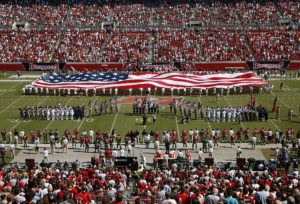
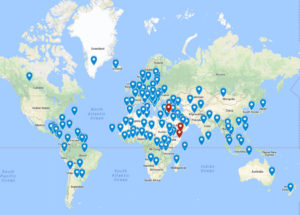
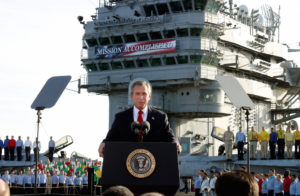
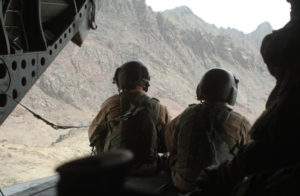


You need to be a supporter to comment.
There are currently no responses to this article.
Be the first to respond.